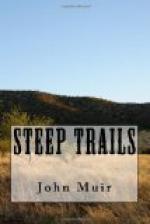My companions stooped down and examined the fleeces for themselves, pulling out tufts and ringlets, spinning them between their fingers, and measuring the length of the staple, each in turn paying tribute to wildness. It was finer, and no mistake; finer than Spanish Merino. Wild wool is finer than tame.
“Here,” said I, “is an argument for fine wildness that needs no explanation. Not that such arguments are by any means rare, for all wildness is finer than tameness, but because fine wool is appreciable by everybody alike—from the most speculative president of national wool-growers’ associations all the way down to the gude-wife spinning by her ingleside.”
Nature is a good mother, and sees well to the clothing of her many bairns—birds with smoothly imbricated feathers, beetles with shining jackets, and bears with shaggy furs. In the tropical south, where the sun warms like a fire, they are allowed to go thinly clad; but in the snowy northland she takes care to clothe warmly. The squirrel has socks and mittens, and a tail broad enough for a blanket; the grouse is densely feathered down to the ends of his toes; and the wild sheep, besides his undergarment of fine wool, has a thick overcoat of hair that sheds off both the snow and the rain. Other provisions and adaptations in the dresses of animals, relating less to climate than to the more mechanical circumstances of life, are made with the same consummate skill that characterizes all the love work of Nature. Land, water, and air, jagged rocks, muddy ground, sand beds, forests, underbrush, grassy plains, etc., are considered in all their possible combinations while the clothing of her beautiful wildlings is preparing. No matter what the circumstances of their lives may be, she never allows them to go dirty or ragged. The mole, living always in the dark and in the dirt, is yet as clean as the otter or the wave-washed seal; and our wild sheep, wading in snow, roaming through bushes, and leaping among jagged storm-beaten cliffs, wears a dress so exquisitely adapted to its mountain life that it is always found as unruffled and stainless as a bird.




